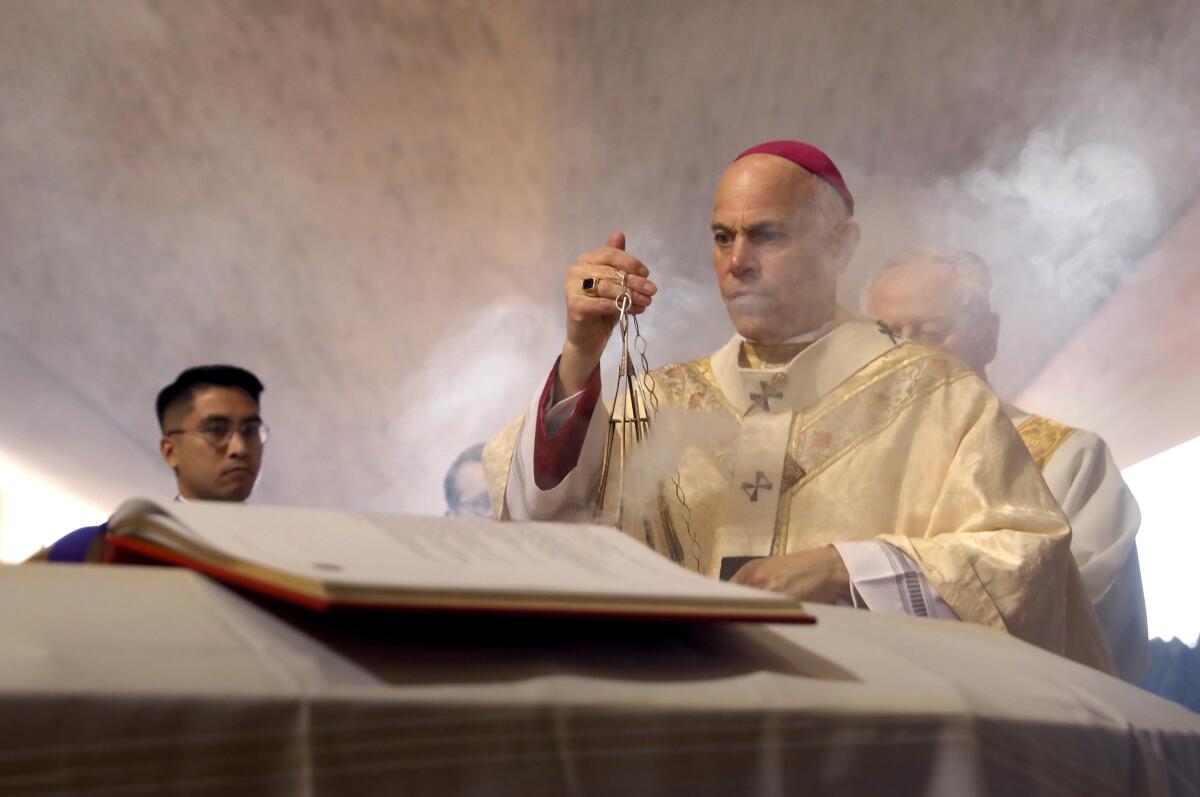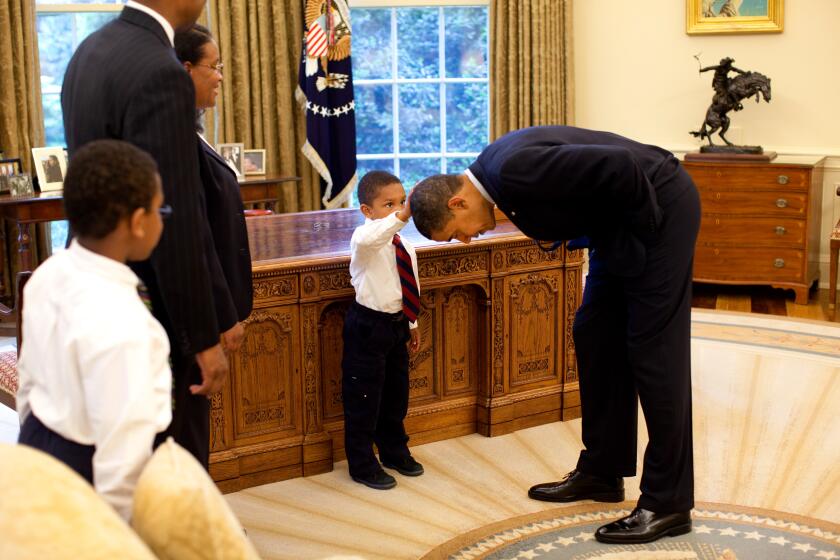Column: With bishops like these, it’s hard to be Catholic

- Share via
To flip the famed line from “The Godfather Part III,” just when I think I might return to the Catholic Church, they pull me back out.
“They” are the church’s archbishops and bishops, in particular those in the United States, who not only advocate for the church’s teachings against gay rights, contraception and abortion, which is their right, but also repeatedly enforce them in ways that often seem un-Christian and downright wicked. All the while, the church’s pedophilia scandal persists into a third decade because of the clerics’ coverups.
What would Jesus do? Not act like these guys.
On Monday, two weeks after the archbishop of San Francisco, the archconservative Salvatore Cordileone, ordered that House Speaker Nancy Pelosi not receive Communion because of her support for abortion rights, leaders of the Colorado Catholic Conference sent an open letter condemning state lawmakers who’d voted for an abortion-rights bill.
Opinion Columnist
Jackie Calmes
Jackie Calmes brings a critical eye to the national political scene. She has decades of experience covering the White House and Congress.
The Denver archbishop and three bishops admonished the lawmakers not to take Communion until they performed “public repentance” and confessed their sins to a priest. In contrast, they praised four Republican legislators who opposed the bill. Increasingly, church leaders overtly ally with the Republican Party, despite its general hostility to policies beneficial to needy people once they’re born, to immigrants and to those on death row.
The clerics’ “pro-life” actions in California and Colorado came even as Americans were reeling from news of one mass shooting and then another, including the massacre of fourth-graders. Four bishops wrote a letter to Congress calling for “reasonable gun control measures,” but where’s the muscle and outrage comparable to that against abortion rights?
Seven months ago, the U.S. Conference of Catholic Bishops issued a statement on the sacrament of Communion that stopped short of singling out the pro-choice President Biden for sanction, but only after much debate. While conservative bishops are often critical of the progressive pope, uncommonly so, Biden had just enjoyed a warm meeting with Pope Francis, who blessed the rosary the president routinely carries and urged him to keep taking Communion.
As Francis says, the Communion wafer that Catholics believe incorporates the body of Christ “is not a prize for the perfect.”
With the Supreme Court expected to soon issue a decision overturning abortion rights after a half-century, the divide between Catholic bishops and most rank-and-file church members is likely to widen. A majority of the justices, five, are conservative anti-abortion Catholics.
When Jacob first met Barack Obama, an iconic photo signaled hope. The two reunited this week in a new video.
The U.S. church hierarchy isn’t exactly playing single-issue politics. Opposing gay rights as well as contraception also remain the bishops’ preoccupations, at the expense of attention to poverty, social and racial justice, and nonviolence. Those latter issues are the ones that “my” church emphasized during my first 18 years, including 12 years in Catholic schools. Then came Roe vs. Wade in 1973, and the peace-loving church turned culture warrior.
I recall Masses during which the priests directed us church-goers to use the small pencils and postcards provided in the pews to petition lawmakers against abortion. There were parish convoys to Washington to protest on the anniversary of Roe. And there were the periodic sermons, including one so graphic when I listened from the front pew with my preteen daughters that I switched parishes — and took another step in my walk away from the church.
Yet from early on, even as I accepted the church’s teachings and its authority to preach them, I privately questioned why those positions should bind the state, public officials (including the Catholics among them) and citizens of other faiths.
Again to quote Francis, speaking in this instance about LGBTQ people, “Who am I to judge?”
I’m hardly alone in my estrangement from the church. While Catholicism remains the nation’s largest religious denomination, the church has declined in membership from about a quarter of the U.S. population to roughly one-fifth. Polls consistently show that the hardline positions of so many bishops are anathema to most of their so-called flock.
The bishops may be known as shepherds, but we’re no sheep. A poll of Catholics in mid-May from the Associated Press and NORC Center for Public Affairs Research found that 63% of Catholic adults said abortion should be legal in all or most cases; 68% said Roe should stand. Both percentages are in line with the views of the overall U.S. public.
Two-thirds of Catholic adults said Catholic politicians who are pro-abortion rights should not be denied Communion, and even more — 77% — said that Catholics who identify as LGBTQ should be allowed to receive Communion.
Still, a Catholic diocese in Michigan recently said its pastors should deny the sacraments, including baptism and Communion, to transgender, gay and nonbinary Catholics “unless the person has repented.” That’s rich coming from “leaders” of a church in which a disproportionate number of priests are gay.
Thank God, literally, for the dissenters like Archbishop Michael Jackels of Dubuque, Iowa, who recently said that “protecting the Earth, our common home, or making food, water, shelter, education and healthcare accessible, or defense against gun violence… these are life issues too.”
It’s priests like him, and the sentiments they espouse, that entice me to return to the church. Yet there are just too few like him among the men in charge. The self-righteous Cordileones are setting the tone, in religion and politics. And they keep pulling me back out.
More to Read
A cure for the common opinion
Get thought-provoking perspectives with our weekly newsletter.
You may occasionally receive promotional content from the Los Angeles Times.













